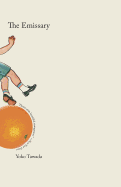
German and Japanese novelist Yoko Tawada (Where Europe Begins, Facing the Bridge) has written a strangely beautiful and hauntingly powerful story in The Emissary. It touches on mortality with a far-expanding discourse on the joys of life amidst suffering in a fantastic version of post-Fukushima Japan.
Natural disaster and contamination have devastated a large area of the main island, cutting it off from the rest of the world. Spiders and crows are the surviving wildlife. The hale and seemingly immortal centenarians shoulder the burdens of the labor force, while children are frail and prematurely aged, orphans who barely walk, malnourished due to poor digestion.
Three narrators--108-year old novelist Yoshiro, his wife, Marika, and their orphaned great-grandson Mumei--describe the impact this devastation and isolation has wrought on their lives. Yoshiro, filled with devotion, tenderness and wisdom for Mumei, constantly frets over his maladies while dwelling on the mistakes of the past. Mumei, in turn, accepts his fate with stoicism and resolve, but worries about Yoshiro's immortal burden. Marika is a member of a secret society charged with identifying children to serve as emissaries abroad, scientific subjects in a study to prevent disaster-based diseases. She tries to subvert Mumei's identification as an emissary for fear of losing him.
Tawada paints in stark lyricism a visually stunning metaphor of the separation between youth and elderly, vitality and sickness. Most important, The Emissary illustrates how human companionship--and its impending loss--is the thread by which one ultimately clings to life. --Nancy Powell, freelance writer and technical consultant

